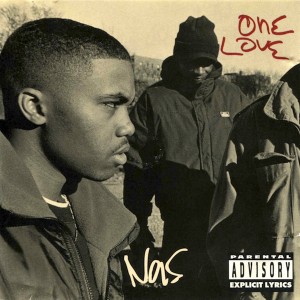One Love (Nas song)
| "One Love" | ||||
|---|---|---|---|---|
 |
||||
| Single by Nas featuring Q-Tip | ||||
| from the album Illmatic | ||||
| Released | October 25, 1994 | |||
| Format | 12" single | |||
| Recorded | 1993 | |||
| Genre | East Coast hip hop | |||
| Length | 5:25 | |||
| Label | Columbia | |||
| Songwriter(s) | Nasir Jones, Jonathan Davis, Jimmy Heath | |||
| Producer(s) | Q-Tip | |||
| Nas singles chronology | ||||
|
||||
| Q-Tip singles chronology | ||||
|
||||
| Illmatic track listing | ||||
|
||||
"One Love" is a song by American rapper Nas, released October 25, 1994 on Columbia Records. It was issued as the fifth and final radio single in promotion of his debut studio album Illmatic (1994). The song was produced by Q-Tip of A Tribe Called Quest, who also contributed vocals for the chorus line. According to Nas, the title of the song originates from Jamaican singer-songwriter and musician Bob Marley's song of the same name.
"One Love" is composed as a series of letters written by Nas to his incarcerated friends, describing events that have occurred prior to and after the receivers' imprisonment. "One Love" contains samples of the Heath Brothers' "Smilin' Billy Suite Part II" (1975) and Parliament's "Come In Out the Rain" (1970). In the song's first verse, Nas references fellow Queensbridge emcee Cormega, whose rapping career had been put on hold due to his incarceration during the early 1990s. In 2008, VH1 named "One Love" the forty-eighth greatest hip hop song.
Produced by Q-Tip, "One Love" samples the mbira (thumb piano), double bass and piano from the Heath Brothers' "Smilin' Billy Suite Part II" (1975) and contains a drum break from Parliament's "Come In Out the Rain" (1970), which add to the song's mystical and hypnotic soundscape.
Lyrically, "One Love" is composed of a series of letters written by Nas to incarcerated friends, recounting mutual acquaintances and events that have occurred since the receiver's imprisonment, including unfaithful girlfriends, emotionally tortured mothers and underdog loyalty. According to one writer, the phrase "one love" represents street loyalty in the song. Nas later explained that the title of the song originated from Jamaican singer-songwriter Bob Marley's song of the same name, which, according to writer Mickey Hess, "echoed the ubiquitous street salutation 'one' (similar to 'peace') used around Nas's neighborhood." In a 1994 article on the distinct styles of East Coast and West Coast hip hop, music journalist Touré referred to "One Love" as an example of the thematic differences between the two regional scenes, stating:
...
Wikipedia
